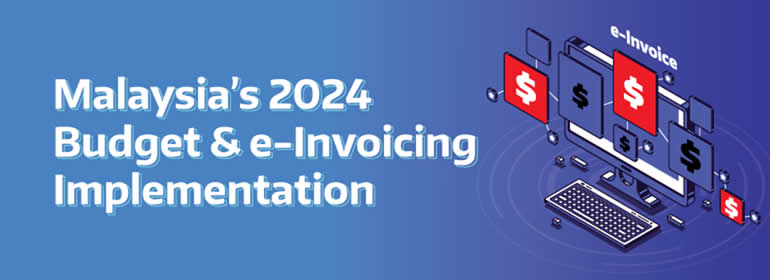
Malaysia’s 2024 Budget and e-Invoicing Implementation
The theme for the Malaysian Budget for 2024 "Reformasi Ekonomi, Memperkasakan Rakyat" (Economic Reform, Empowering People), involving an allocation of RM393.8 billion, with a big share allocated for operating expenditure and the rest reserved for development and contingency savings.
Also as the Finance Minister of the nation, Prime Minister Dato' Seri Anwar Ibrahim announced that the 2024 budget will focuses more on economic reformation, at the same time empowering the rakyat, and reducing the cost of living. According to official portal of Ministry of Finance Malaysia, some of the key measures include:
- Increasing the Service Tax from 6% to 8%.
- Implementing targeted subsidies in stages starting 2024.
- Increasing Rahmah Cash Aid allocation from RM8 billion to RM10 billion.
- Lifting ceiling price controls for chicken and eggs.
- Allocating RM6.8 billion for technical and vocational education and training (TVET) education.
- Relaxing the conditions of Malaysia My Second Home (MM2H) application.
- Allocating RM2.4 billion to Felda, Felcra and Risda to boost agri-commodity activities, enhance socio-economic wellbeing of smallholders.
- Allocating RM11.8 billion for flood mitigation projects.
- Allocating RM2.6 billion in subsidies, incentives for paddy farmers, and fishermen.
- Increasing floor price of rice to RM1,300 per metric tonne to boost farmers’ income.
- Allocating RM400 million to implement Food Security Strengthening program.
- Allocating RM50 million under the Agricultural Disaster Fund to compensate operators of up to 50% of losses due to disasters.
- Fishermen to receive a monthly subsistence allowance of up to RM300 and a catch incentive of up to RM1,000.
- Allocating RM58.1 billion to fund various initiatives including subsidies, incentives, and assistance, with almost 50% of the allocation for controlling prices of goods and services.
- Allocating RM200 million to continue the implementation of Payung Rahmah initiatives.
- Increasing allocation for Rahmah Cash Aid (STR) from RM8billion to RM10 billion, around nine million beneficiaries expected.
- Increasing maximum rate for STR from RM3,100 to RM3,700, while minimum rate for youths increased to from RM350 to RM500.
- Allocating over RM2.4 billion to Social Welfare Department (JKM) to benefit more than 450,000 people including hardcore poor households, elderly, children, and disabled.
- The largest allocation for 2024, by allocating RM58.7 billion to Education Ministry.
- And for Higher Education Ministry also benefited by RM16.3 billion allocation.
- Agreeing to provide discounts for PTPTN loan repayments starting from Oct 14, 2023 until March 31, 2024.
- Allocating RM41.2 billion to Health Ministry next year.
- Raising excise duty rate for sugary drinks from 40 sen to 50 sen per litre.
- Expanding MADANI Medical Scheme nationwide with an allocation of RM100 million, estimate to benefit 700,000 people.
- Resolve water supply and issues particularly in states such as Kelantan, Sabah and Labuan with the budget of RM1.1 billion.
- Allocating RM60 million to develop 5G Cyber Security Testing Framework and local expertise on 5G technology.
- Completing Sarawak Pan Borneo Highway in 2024.
- Allocating a total of RM2.47 billion for the implementation of people's housing projects in 2024.
- Allocating RM19.7 billion to Defence Ministry.
- Allocating RM19 billion to Home Ministry with RM1.9 billion allocation for Islamic affairs.
- Providing up to RM1,000 tax relief for the purchase of sports equipment and activities.
- Giving civil servants in grades 56 and below including contract staff to receive RM2,000 incentive, to be paid end-Feb 2024.
- Giving government pensioners including veterans to receive RM1,000 expect on end-Feb 2024.
- And many more.
The second Madani Budget introduces bold reforms to Malaysia's finances while making the country more attractive to investors with targeted incentives, as well as prioritizes the well-being of the rakyats, especially lower-income groups and vulnerable segments of society, by providing necessary support to offset the rising cost of living.
"The government is committed to revitalise the economy during challenging times" said Prime Minister Dato' Seri Anwar Ibrahim.
"And for LHDN e-Invoicing, the latest updates states that starting August 1, 2024, taxpayers with annual income or sales exceeding RM100 million will be required to implement e-invoicing, instead of June 1, 2024, and will be implemented gradually for taxpayers in other income categories, with an earlier full implementation target of July 1, 2025.
Stay tune with AutoCount and get ready for more coming details on governmental, taxation and e-Invoicing updates, e-Invoicing will be made available within AutoCount’s system once the government has issued the software development kit, to view AutoCount’s accounting and cloud accounting solution, click on the link below: